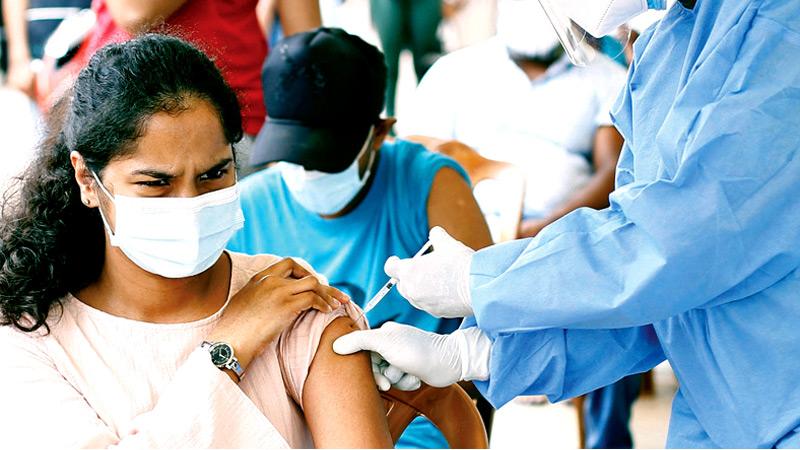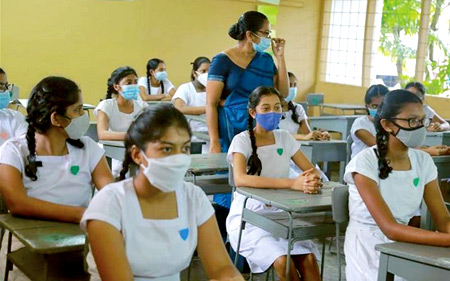
 The current debate on vaccines could make one believe that vaccination is a relatively modern invention and concept. On the contrary, vaccines have been around for around 200 years. In fact, some vaccines have been so successful that several diseases have been eradicated from our midst, including smallpox and polio, though the latter is still rarely found in Afghanistan and Pakistan.
The current debate on vaccines could make one believe that vaccination is a relatively modern invention and concept. On the contrary, vaccines have been around for around 200 years. In fact, some vaccines have been so successful that several diseases have been eradicated from our midst, including smallpox and polio, though the latter is still rarely found in Afghanistan and Pakistan.
 Sri Lankans are no strangers to vaccines, with the country’s childhood immunisation program being one of the most successful in the world. Thanks to the immunisation programme, Sri Lanka also has one of the lowest infant and children’s mortality rates in the developing world.
Sri Lankans are no strangers to vaccines, with the country’s childhood immunisation program being one of the most successful in the world. Thanks to the immunisation programme, Sri Lanka also has one of the lowest infant and children’s mortality rates in the developing world.
Childhood diseases
Unlike in some other countries, Sri Lankans have not shown any hesitancy towards vaccines. Thus has enabled the authorities to vaccinate practically every child against several childhood diseases. All Sri Lankans bear the scars left by vaccination on their upper arms.
We are focusing on this topic in the context of Covid-19, the disease caused by a novel Coronavirus that emerged at the very end of 2019. Aided by international travel, the virus has now spread to every corner of the world, including Antarctica. It had infected roughly half a billion people and claimed the lives of around five million people around the world. In Sri Lanka, around half a million people have been infected, while deaths have exceeded 15,000.
Humans are no strangers to Coronaviruses. Even the common cold and the flu are caused by Coronaviruses and there are many other diseases caused by this type of virus. However, since this was a totally new type of Coronavirus, no one had any immunity to it. Hence the virus was able to claim a large number of lives at least in the initial stages. During the intervening 100 years since the devastating Spanish Flu which killed an estimated 50 million people, scientists have learned a great deal about viruses. But there is still no cure per se for any viral diseases, unlike diseases caused by bacteria which can be addressed with antibiotics.
Thus the only way to deal with viral diseases is preventing them in the first place. This is why doctors advocate social distancing, hand washing and face masks to prevent the spread of Covid. But we might not always be able to practise these measures in the real world. For example, maintaining social distancing would be impossible in a crowded office train.
This is where vaccines come in. Many other viral diseases can be tackled successfully with vaccines, including the common cold itself. But the speed with which vaccines were developed with totally new technologies for Covid surprised many and led to scepticism as to whether they really work. But if one analyses vaccine development over the years, this will come as no surprise. By the time Chinese scientists published the genome sequence of the novel Coronavirus in January 2020, scientists were already armed with technologies such as mRNA, which they had been working on for at least two decades. Thus producing a vaccine was only a matter of time – in this case just 11 months from start to worldwide approval. In this light, there is nothing to fear about the super fast development of the vaccines. Moreover vaccines cannot alter one’s genes or cause infertility. On the other hand, all vaccines do have some side effects, which are mostly mild and disappear in a few days. Very rarely, a few among millions of vaccine recipients can get more serious complications.
Misinformation
Unfortunately, there is a lot of misinformation about Covid-19 vaccines on social media, posted mostly by so-called anti-vaxxers and far-right extremists. Many people have swallowed these false narratives hook, line and sinker. None of it is true. Scientists have debunked all of their claims and anyone can get true information on vaccines on the Net.
But the best proof that vaccines work is right before our eyes. Vaccines have prevented countless hospitalisations and deaths, period. Yes, it is still possible to catch Covid even after vaccination, but the symptoms are likely to be rather mild. There is no doubt at all that vaccines boost one’s Immunity against Covid.
Vaccine efficacy wanes over time and almost all of the vaccines now available in the market lose their potency after around six months. This is why Governments around the world have introduced booster shots for their populations. These literally give a boost to the immune system. Sri Lanka too has introduced a third or booster shot for Covid, where the Pfizer/BioNTech vaccine is exclusively used.
It is essential that everyone who is eligible gets the booster shot in order to keep the current Omicron variant of the Coronavirus at bay. According to scientists, the virus gets more opportunities to produce more variants when there are a lot of unvaccinated and hence immunocompromised people in society. While Omicron seems to be a mild variant, the next one could be even more lethal than the Delta variant. This is a danger that we should avoid. The key to that is the booster dose. In the future, it might be necessary to give a fourth booster shot or even annual Covid shots to maintain immunity.
Some countries such as Israel already administer a fourth dose.
 Besides, those who have not received all three doses could find themselves locked out of public places in Sri Lanka from May, under new laws to be promulgated by the Government. This is one more reason and incentive to get the booster jab.
Besides, those who have not received all three doses could find themselves locked out of public places in Sri Lanka from May, under new laws to be promulgated by the Government. This is one more reason and incentive to get the booster jab.
This is already practised in many other countries including many Western democracies. One should not have the “freedom” to infect others with Covid-19, even if one is entitled to forego vaccination under current laws.
There are many other benefits of vaccination. Pregnant women who get the jab are less likely to transmit Covid to their babies.
Enhanced immunity
And those who get Covid even after getting the jab are said to getenhanced immunity against Omicron and all other variants.
In this backdrop, getting the booster dose may perhaps be the biggest gift you can give to yourself and to the society.
